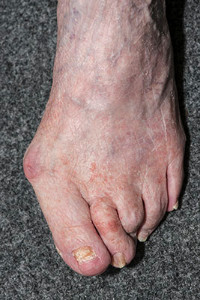
Drexel Hill (484) 521-0233
West Chester (610) 436-5883

Drexel Hill (484) 521-0233
West Chester (610) 436-5883
 While the exact cause of bunions is unknown, there are things that can exacerbate them. These may include improper footwear, such as pointed shoes, high heels, and shoes that are too narrow across the bottom of the toes. Since the toe typically bears most of the body’s weight, poor footwear can lead to increased wear and tear; this can increase the severity of bunions. Additionally, genetics may play a role because foot structure and shape are hereditary. It’s also common for bunions to become more pronounced for those whose occupations consist of standing or walking. Treatments can include adding padding in the shoes for protection, wearing a shoe with a flexible sole for support, and possibly stretching your shoes to make room for the bunion. If you think you have a bunion, it is recommended to consult a podiatrist for a proper evaluation.
While the exact cause of bunions is unknown, there are things that can exacerbate them. These may include improper footwear, such as pointed shoes, high heels, and shoes that are too narrow across the bottom of the toes. Since the toe typically bears most of the body’s weight, poor footwear can lead to increased wear and tear; this can increase the severity of bunions. Additionally, genetics may play a role because foot structure and shape are hereditary. It’s also common for bunions to become more pronounced for those whose occupations consist of standing or walking. Treatments can include adding padding in the shoes for protection, wearing a shoe with a flexible sole for support, and possibly stretching your shoes to make room for the bunion. If you think you have a bunion, it is recommended to consult a podiatrist for a proper evaluation.
If you are suffering from bunions, contact the podiatrists of Dr. Siegerman & Associates. Our doctors can provide the care you need to keep you pain-free and on your feet.
What Is a Bunion?
A bunion is formed of swollen tissue or an enlargement of boney growth, usually located at the base joint of the toe that connects to the foot. The swelling occurs due to the bones in the big toe shifting inward, which impacts the other toes of the foot. This causes the area around the base of the big toe to become inflamed and painful.
Why Do Bunions Form?
Genetics – Susceptibility to bunions are often hereditary
Stress on the feet – Poorly fitted and uncomfortable footwear that places stress on feet, such as heels, can worsen existing bunions
How Are Bunions Diagnosed?
Doctors often perform two tests – blood tests and x-rays – when trying to diagnose bunions, especially in the early stages of development. Blood tests help determine if the foot pain is being caused by something else, such as arthritis, while x-rays provide a clear picture of your bone structure to your doctor.
How Are Bunions Treated?
If you have any questions, please feel free to contact one of our offices located in Drexel Hill and West Chester, PA . We offer the newest diagnostic and treatment technologies for all your foot care needs.
Request a free copy of
Laser Away Foot Pain!
today.
